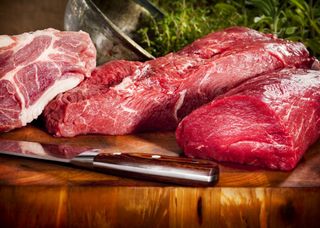Skipping Red Meat May Lower Breast Cancer Risk

Women who eat more poultry, fish, nuts and legumes, and less red meat when they are young adults might have lower risk of developing breast cancer later in life, according to a new study.
The researchers looked at nearly 89,000 women ages 26 to 45, and followed them for 20 years to look at links between the women's diet, as they reported it in 1991, and their risk of breast cancer. By the end of the study period, 2,830 women had been diagnosed with breast cancer.
The women who reported the highest consumption of red meat, about 1.6 servings daily, had a 22 percent higher risk of breast cancer compared with women who ate the least red meat, or about 0.2 servings daily, according to the findings published today (June 10) in the journal BMJ.
"Each serving per day increase in red meat was associated with a 13 percent increase in risk of breast cancer," the researchers wrote in their paper. This increase is relatively small, but because breast cancer is a relatively common cancer, "the absolute number of excess cases attributable to red meat intake would be substantial, and hence, a public health concern," they wrote. [6 Foods That May Affect Breast Cancer Risk]
The results also showed that eating more poultry in early adulthood was associated with a lower risk of breast cancer in postmenopausal women.
The researchers estimated that replacing one daily serving of red meat with a serving of other protein-rich foods may reduce risk of breast cancer by 14 percent. Red meat alternatives include legumes, nuts, poultry and fish.
Previous studies have linked red meat to several cancers, particularly colon cancer. Although it's not clear how red meat may increase the risk of cancer, researchers are investigating several possible mechanisms. For example, cooking meat at high temperatures can produce cancer-causing chemicals. Meat proteins may also promote tumors' growth by triggering growth hormones, which could explain the link.
Sign up for the Live Science daily newsletter now
Get the world’s most fascinating discoveries delivered straight to your inbox.
Studies have produced mixed results on the link between red meat and breast cancer. However, most previous studies focused on people's diets during midlife and later, whereas it is possible that diet during early adulthood has greater effects on the development of breast cancer, the researchers said.
In the study, red meat included both unprocessed and processed meat products. Poultry included chicken and turkey, and fish included tuna, salmon, mackerel and sardines.
The results held when the researchers accounted for other factors that could affect the risk of breast cancer, such as age, weight, race, family history of breast cancer, history of benign breast disease, smoking habits and oral contraceptive use.
The researchers examined whether the link between red meat and breast cancer risk would change when levels of other risk factors changed. They found that only oral contraceptives seemed to further increase the risk associated with red meat. For each daily serving of red meat, the risk of breast cancer was 54 percent higher among women who currently used oral contraceptives and 11 percent higher in women who were former users of the contraceptives.
The researchers detailed the findings today (June 10) in the journal BMJ.
Email Bahar Gholipour. Follow us @LiveScience, Facebook & Google+. Original article on Live Science.

